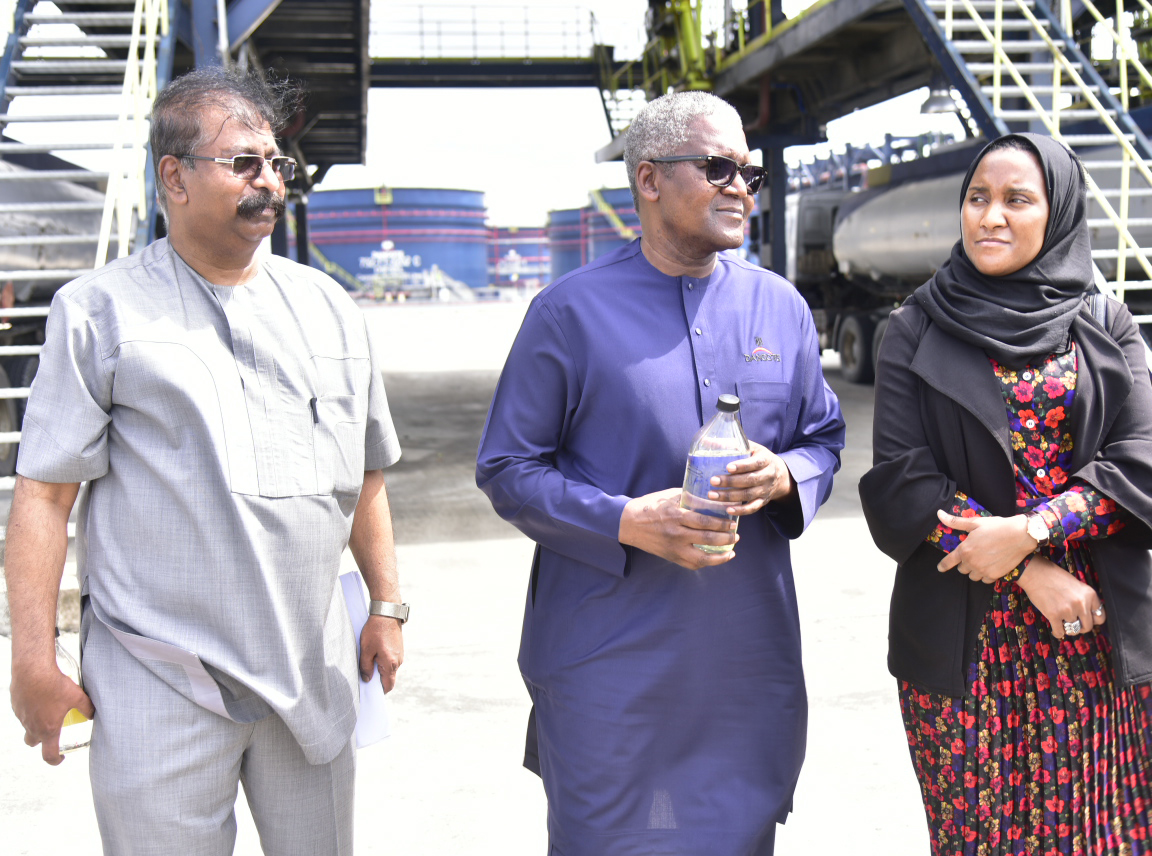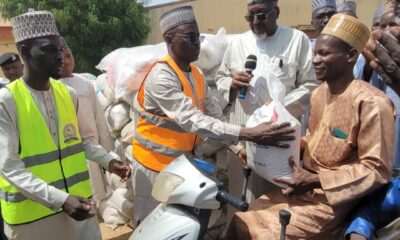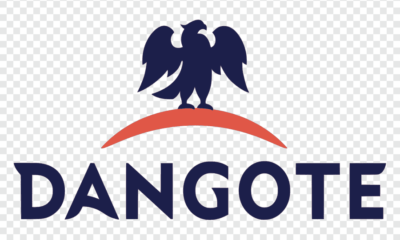Energy
Dangote Refinery Launches Euro-V Petrol

. . . Assures On Steady Supply, End Of Polypropylene Importation By Oct
The good news about the rollout of premium motor spirit (PMS) also known as petrol by the Dangote Petroleum Refinery and Petrochemicals is that Nigerians will enjoy steady supply and gain a clear understanding of the country’s actual fuel consumption.
The President of the Dangote Group, Aliko Dangote, offered the assurances at the refinery in Ibeju-Lekki, Lagos, while confirming the rollout of petrol, from the world’s largest single-train refinery with a capacity of 650,000 barrels per day.
On the achievement of starting PMS production 28 years after Nigeria’s four refineries ceased domestic refining, Dangote, emphasised that this development would boost the industrial and manufacturing sectors.
He highlighted that the refinery would significantly reduce fuel imports, saving foreign exchange, and contributing to stabilising the naira, lowering inflation, and reducing the cost of living.
Dangote, accompanied by Vice President of Oil and Gas at Dangote Industries Limited (DIL), Devakumar Edwin, and Group Commercial Operations Director at DIL, Hajiya Fatima Aliko-Dangote, described this milestone as a transformative moment for Nigeria, ending years of fuel imports.
He expressed gratitude to Nigerians for their support and praised President Bola Ahmed Tinubu for fostering an environment that made the successful launch of the 650,000 barrels per day refinery possible.
He stated, “Today is a momentous occasion because Nigeria has not produced petrol, or gasoline, for many years. As I stand here, I want to extend my gratitude to the people of Nigeria and to President Bola Ahmed Tinubu’s administration for creating the environment that has enabled us to achieve this monumental task. This development will provide energy for our nation’s growth, development, and prosperity.”
He continued, “I want to personally thank Mr. President for introducing the concept of ‘Naira for Crude’ and ‘Naira for Products.’ This initiative will bring much-needed stability to the Naira by reducing the demand for dollars in the market by 40%, which will help stabilise the exchange rate.
“But that’s not all. It will also address issues like ‘round-tripping,’ where fuel is documented but doesn’t actually enter Nigeria. With this new refinery, we will have a clear view of true consumption. We’ll be able to track every loaded truck and, as much as possible, monitor loaded ships. This will allow us to precisely determine consumption patterns, though that’s a topic for another discussion.
“Today, we are here to celebrate and give thanks to God Almighty for bringing us to this point where we can produce gasoline. Many doubted we would achieve this, but we have delivered.
“We owe a debt of gratitude to the President and his government. Without their support, we wouldn’t be where we are today. I believe this refinery will transform not only Nigeria but also the entire Sub-Saharan Africa. Our capacity will not only meet Nigeria’s needs but also serve the demands of the broader region.”
Dangote remarked, “This petrol might be a bit cleaner compared to what we had before. It’s of the highest quality, ensuring that your vehicle’s engine will last longer. The quality of this fuel can match any premium standard worldwide, including those in Europe and America. No one can surpass us in terms of quality. Today is truly a celebration for us Nigerians.
“We are committed to ensuring that starting in October, there will be no need to import polypropylene. Our petrochemical plant will be fully capable of meeting all local demands.”
While assuring that the refinery will guarantee the availability of petrol in Nigeria, Dangote clarified that the nation’s oil company, the Nigerian National Petroleum Corporation Limited, NNPCL, is responsible for controlling petrol pump prices.
He described this development as a significant turnaround for the country, ending years of not producing a single litre of petrol domestically.
Dangote emphasised that while he can ensure a steady supply of fuel from the refinery, the NNPC Ltd will manage pricing.
“Pricing is controlled by NNPC. For now, we focus on ensuring that the products are available — that’s what I can guarantee,” Dangote said.
Energy
SNEPCo, Former MD Aiboni Win Energy Times’ Awards

The Shell Nigeria Exploration and Production Company (SNEPCo) has been named Major Oil Company of the Year for last year by a Nigerian publication, Energy Times.
Biztellers reports that this is in recognition of the company’s contributions to deep-water oil and gas development and the industry generally.
Energy Times also awarded the title of Amazon of Nigeria’s Oil Sector for 2024 to Elohor Aiboni, a former Managing Director of SNEPCo now on international assignment in Brunei.
The awards were presented to SNEPCo’s Senior Operations Manager, Bolanle Odunayo-Ojo, who represented the Managing Director, Ronald Adams at a ceremony attended by key stakeholders in the oil and gas sector.
ALSO READ: BREAKING: Again, Dangote Cuts Petrol Price To N835 per Litre
“We are honored to receive the recognitions for the company and our former Managing Director as they underscore our dedication to excellence in the upstream sector,” Bolanle stated. “The modest achievements are result from teamwork and support by our partners, particularly the Nigerian National Petroleum Company Limited and regulatory agencies. The awards encourage us to continue to work together to power progress and innovation in Nigeria’s energy landscape.”
The SNEPCo has been a pioneer in Nigeria’s deep-water oil and gas production since it began production from Bonga in 2005, Nigeria’s first deep-water well. Gas from Bonga is also piped to Nigeria Liquefied Natural Gas Company Limited at Bonny Island. SNEPCo’s operations have led to significant discoveries, including Bonga Southwest in 2001 and Bonga Northwest, which began production on August 5, 2014.
In its award, the Board of Directors of Energy Times pointed to the continuing success of Bonga, notably production of the 1 billionth barrel of oil in February 2023 and the recent Final Investment Decision on the $5 billion Bonga North project.
The award on Aiboni’s highlights a career that has seen her serve in various business and leadership roles within and outside Nigeria. She was appointed Managing Director of SNEPCo in 2021 and led initiatives that deepened operational efficiency, local content development and social investment projects across the six geopolitical zones in the country.
Energy
Shell Commends Oloibiri Lecture Series As Platform For Change

Shell Nigeria Exploration and Production Company Ltd (SNEPCo,) one of the sponsors of the Oloibiri Lecture Series and Energy Forum (OLEF) has commended it as a platform for driving change in Nigeria’s energy sector through the discussions that centre on business performance, cost discipline and process simplification.
“This event is special to the Shell brand, not only because of the nostalgia of Oloibiri but the quality of discourse it has enabled in our sector over the years,” SNEPCO Managing Director Ronald Adams said in a goodwill speech delivered by General Manager, Wells and Geosciences Operations Joe Mordi. He said: “We are grateful to the Society of Petroleum Engineers and our host the Petroleum Technology Development Fund (PTDF) for another successful outing.”
Organised by the Society of Petroleum Engineers (SPE) Nigeria Council, the Oloibiri Lecture Series and Energy Forum began in 1991, in commemoration of the country’s first commercial oil discovery by Shell at Oloibiri, Bayelsa State, in 1956. Ronald said recent developments in the Upstream and Downstream sectors of the energy industry, including the $5-billion final investment decision by Shell in the Bonga North Deepwater project echoed the sentiments around the first oil discovery.
ALSO READ: No Safety Guarantee For Unscheduled Visitors To Benue – Gov Alia
He noted that, “These strides come with a commitment to excellence required of us – for stakeholders, colleagues, our country and indeed, future generations. The theme for this year ‘Driving energy sustainability through technology, policy and supply chain excellence’ reflects this commitment. The future is bright, and we have the opportunity to co-create it.”
Energy
NLNG Improves Nigeria’s Domestic LPG Supply Efficiency

In line with its continuous improvement culture, the Nigeria LNG Limited (NLNG) will be working closely with its stakeholders to improve operational efficiency in its domestic Liquefied Petroleum Gas (DLPG) supply in Nigeria.
According to a statement from its General Manager, External Relations and Sustainable Development, Sophia Horsfall, this was highlighted at an engagement session with stakeholders in Lagos.
It was gathered that the NLNG plans to enhance engagement and improve operational efficiency of its LPG supply through digitalisation of some of its processes which include a new platform designed to streamline regulatory processes, optimise risk management, and enhance the buyer experience. The platform will feature IT-supported relationship management, automated issue resolution, centralised real-time payments, and improved case management systems, ensuring a seamless supply process despite market shifts and external pressures.
ALSO READ: Ifon-Ilobu Crisis: Adeleke Assures Of Quick Restoration Of Peace
Manager, Commercial Contract Management, NLNG, Tolulope Longe, reiterated that the planned improvements will enable and consolidate NLNG’s resolve to delivering 100% of its LPG supply to the Nigerian market.
She said a strategic roadmap was in play to ensure the achievement of NLNG’s longstanding goals of LPG being accessible and available in the country, aligning with its vision of being a globally competitive energy company, improving lives sustainably. She also harped on the significance of these improvement initiatives and the Company’s push for LPG utilisation as a clean energy source alternative to kerosene and other fossil fuels
Longe noted that the Company remained focused on growth and sustainability of the LPG market by continuously enhancing its supply processes in collaboration with offtakers. She stressed NLNG’s commitment to collaborating with stakeholders to maintain pricing stability and long-term market viability. While acknowledging industry concerns, she noted the importance of operational efficiency in meeting market demands.
NLNG aims to strengthen stakeholder engagement and improve market efficiency in the LPG sector through enhanced customer interactions, minimised schedule disruptions, timely confirmations and deliveries, and prioritisation of customers with demonstrable capacity. As it adapts to market realities, NLNG remains committed to driving sustainability and delivering lasting value to Nigerians.

























